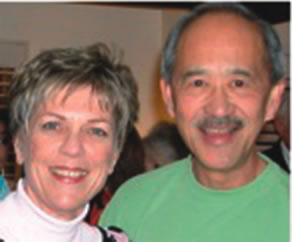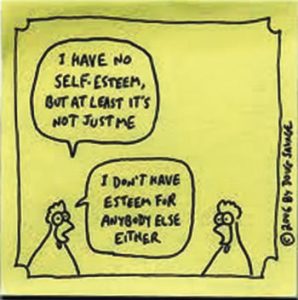Talking about Spirituality Today:
Self-esteem and self–denial
So far, this series has looked at some basics in Spirituality. We are called to grow in God’s image which means, for St. Irenaeus, to become ‘fully alive.’ And ‘fully alive’ is to live in an ever-deepening or, in Biblical terms, ‘face to face’ relationship with God.
Again, Christian spirituality is about the ‘whole’ person- but ‘whole’ in what way? The answer is found when Jesus affirms the Lawyer’s reply to the question about how to inherit eternal life: ‘You must love the Lord God with all your heart, with all your soul, with all your strength, and with all your mind, and your neighbor as yourself’ (Luke 10: 25-8).
It seems utterly simple. Jesus appeals to the ‘heart’. As we saw last month, ‘heart’ refers to the whole person, to that deepest core that directs and shapes how we respond and act.
Wilkie Au is helpful here. He has graciously consented we draw on his excellent book By Way of the Heart. Using a model from Donald Goergen, Professor Au offers a model of spiritual growth built on Five Gospel Loves: God, neighbour, community, particular love [friendship] and self-love.
Each Gospel love entails a balance of opposites. Integrating these loves is a life-long task and is, ultimately, God’s work of gradual transformation. This month we will explore the first Gospel love: self-esteem and self-denial.
Self-Esteem
Taking Jesus seriously means taking seriously ‘love your neighbour as yourself.’ Many years ago, CS Lewis began a sermon with the question ‘What is the greatest virtue?’ He suggested many would answer ‘unselfishness.’ He then points out that the early Christians would answer ‘love.’ A negative has replaced a positive.
Lewis suggests what may underlie this. It is an attitude that sees desire as something less than worthy. He points out that Jesus’ teaching appeals to desire. His words to Bartimaeus sum it up: ‘What do you want me to do for you?’
Beneath all Jesus’ interactions was his appeal to the human desire to be happy. This yearning is not selfish in itself. It is implanted in us by God to draw us out of ourselves: to seek so as to find, to ask for the door to be opened, to reach out so that gifts will be poured into our laps. Thomas Aquinas suggested that inside the desire for happiness we find the desire for God.
Just as there is goodness in our desire to be happy, so there is something good about recognizing our own goodness. ‘You are precious in my eyes and honoured and I love you’ Isaiah reminds us.
Perhaps there is a problem with English words: ‘self-love’ may imply self-centred’? Or ‘self-esteem’ suggests a psychological measurement? Perhaps a better phrase is ‘self-acceptance.’ What does it look like?
Self-acceptance is being able to appreciate who one is – one’s gifts and talents. It is able to accept compliments graciously. It can acknowledge one’s limits [I can play the piano but will never play at Carnegie Hall – so what?]. It can recognize and work within one’s limitations, such as of temperament and personality [I’m not very good in that sort of situation, so I ask for help.]
Another word for healthy self-acceptance is humility. It comes from the Latin word ‘humus’ – of the earth. We speak of someone having their feet ‘on the ground.’ Humility is feeling at home about who I am. God loves me just like that.
It is very difficult to accept and love others if I cannot accept myself. If I want to give to others I need a self to give. We all struggle with doubts about ourselves. We are all flawed in some way – from our family background, upbringing, cultural and religious influences.
Some people have a damaged sense of self going right back to childhood, as in a family with an addictive parent. But life offers compensating experiences. With help, support and the experience of being accepted and love, people can find gradual healing and a stronger sense themselves - of self-acceptance. God can work through these.
It may be that the roots of sin are less in pride and more in fear: fear of being needy or of losing something of myself if I focus on someone else. I try to hold on to what I have or to make up for what I think I need (or have missed).
Perhaps pride (I am the centre of the universe which revolves around my needs) arises because I am afraid that, if I just accept who I am, I will lose control of my life.
Remember John Powell SJ’s book built on the comment I’d like to tell you who I am but you may not like me and I’m all I’ve got.
Self – acceptance acknowledges there are parts of me that need healing. None of us have got our act together. It is a life-time journey. What we can rely on is this: I am limited and sinful but I am good.
It also means that, as Au points out, maturity will elude us as long as we disown unattractive or undesirable parts of ourselves and project them onto others. As one Retreat master observed Maturity comes when we stop blaming God for making us the way we are!
In all this, our Christian story reminds us that we ‘cannot compel ourselves to accept ourselves’ as Au notes. Ultimately it is a gift from God. Through grace, we are accepted by the One who is greater than ourselves. It is a gift we must pray for.
For St Ignatius of Loyola, the process of the Spiritual Exercises is built on the grace of experiencing that I am loved by God. With that, I can face, without feeling overwhelmed, those parts of me that are flawed or sinful. This brings us to the other wing of this Gospel love.
Self-Denial
Self-denial can trigger negative reactions, perhaps from its distorted forms. To understand it rightly, we need the Gospels. It certainly is a condition of following Christ - to take up the cross, to lose one’s life in order to save it (Mark 8: 34-5).
Clearly, self-denial has a positive goal. Saying ‘no’ to oneself only finds its meaning in saying ‘yes’ to Jesus, a ‘yes’ to life. Self-denial is not self-hatred. It is not directed at myself but at the ‘I’ that blocks progress along the Way of Jesus towards life.
Last month’s discussion on St Paul helps here. Self-denial is aimed at the ‘unspiritual self.’ This is ou
r tendency to resist, even oppose, God’s Spirit. The Spirit calls me to be receptive to God’s love and life and so to respond that I find and express my true or ‘spiritual self.’
Some writers suggest instead of ‘denying’ self, a better word is ‘transcending’ self. It is about going beyond where I am, to be a more accepting and loving person than I am now.
Again, self-denial is not something abstract. Our sense of being good can only be safe-guarded if we recognize that self-denial is about something specific in me or in my life. It may be about my attitude to money, food and drink, reputation, other people or nurturing as resentment.
These particular, identifiable things can keep me curved in on myself. Whatever the form of self-denial, it should sensitize us more to God’s presence, as happens in the practice of fasting. It helps lessen my resistance to God’s Spirit. By practicing it, I deliberately opt for a mind and heart broader and deeper in scope –more like God’s.
Conclusion
Once, our community was chatting before dinner. We were talking about language – how long words are often thought to mean deep thinking. I asked one of my very insightful fellow Marists this question: ‘Harry, could you sum up the Gospel in twenty words, with no word longer than five letters?’
He paused for half a minute. This was his reply.
I am good ‘cos God loves me.
Not God loves me ‘cos I am good.
Jesus came to tell us that.
Next Month: Prayer and Humour.
Sources:
Wilkie Au, By Way of the Heart: Toward a Holistic Christian Spirituality (Paulist, 1989)
Wilkie Au & Noreen Cannon, Urgings of the Heart: A Spirituality of Integration (Paulist, 1995).
Tagged as: Next Month, self, self denial, self esteem
Comments are closed.




 Entries(RSS)
Entries(RSS)